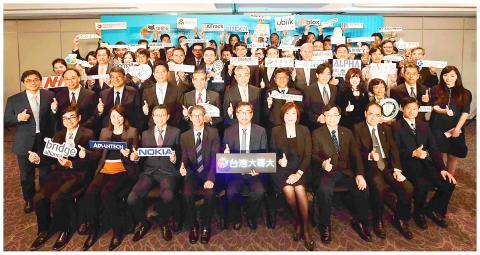Taiwan Mobile Co (台灣大哥大) yesterday said it is teaming up with 50 partners to create the nation’s biggest Internet of Things (IoT) ecosystem, with an ultimate goal of seeking new revenue streams by offering services like data analysis.
The first step in tapping into the market is to expand the scale of IoT devices, although it could make slim profits by offering Internet connections in the initial stage, Taiwan Mobile said.
The company is collaborating with Asian telecom alliance Bridge Alliance, Nokia, light-emitting diodes manufacturers Everlight Electronics Co (億光) and Lite-On Technology Corp (光寶), and “smart” meter module supplier Glory Technology Service Inc (皇輝科技) to explore IoT business opportunities.

Photo: Wang I-hung, Taipei Times
The automative, “smart” home, wearable devices and utilities segments are the fastest-growing areas in the vast IoT market, the nation’s No. 2 telecom operator said.
Taiwan Mobile counts electric carmaker Tesla Inc as one of its IoT customers in the automotive sector.
Benefiting from the fledgling IoT market, Taiwan Mobile expects the number of IoT devices embedded with its SIM cards to more than double to 500,000 units from 200,000 units by the end of this year.
The company has secured 3 million SIM cards for IoT devices from the National Communications Commission.
“All of those SIM cards will be fully used in 2020, given the rapid growth in demand,” Taiwan Mobile president James Cheng (鄭俊卿) said. “The IoT market is expected to take off this year and will continue to be red-hot next year.”
The growth is largely expected to come from the utility and wearable segments over the next three years, Cheng said.
Taiwan Mobile said that in June it plans to bid for the right to install its IoT SIM cards in 200,000 “smart” electric meters.
It is also to supply electronic SIM (eSIM) cards for Apple Inc’s Apple Watch Series 3 in May or June, Taiwan Mobile said.
Taiwan Mobile is in talks with Taiwanese exporters to have their electronics equipped with its SIM cards, which would connect those devices to the Internet overseas using its IoT-bucklescript compiler platform.
The company expects to cut a deal with a local electronics vendor by the end of this year and to facilitate connection for those devices, in addition to completing nationwide deployment of its narrowband IoT network by June.
Local rival Far EasTone Telecommunications Co Ltd (遠傳電信) yesterday said it expects to complete 60 percent of its narrowband IoT network by the end of this month.
It has collaborated with more than 200 partners to offer IoT hardware and software products, the company added.

GROWING OWINGS: While Luxembourg and China swapped the top three spots, the US continued to be the largest exposure for Taiwan for the 41st consecutive quarter The US remained the largest debtor nation to Taiwan’s banking sector for the 41st consecutive quarter at the end of September, after local banks’ exposure to the US market rose more than 2 percent from three months earlier, the central bank said. Exposure to the US increased to US$198.896 billion, up US$4.026 billion, or 2.07 percent, from US$194.87 billion in the previous quarter, data released by the central bank showed on Friday. Of the increase, about US$1.4 billion came from banks’ investments in securitized products and interbank loans in the US, while another US$2.6 billion stemmed from trust assets, including mutual funds,

AI TALENT: No financial details were released about the deal, in which top Groq executives, including its CEO, would join Nvidia to help advance the technology Nvidia Corp has agreed to a licensing deal with artificial intelligence (AI) start-up Groq, furthering its investments in companies connected to the AI boom and gaining the right to add a new type of technology to its products. The world’s largest publicly traded company has paid for the right to use Groq’s technology and is to integrate its chip design into future products. Some of the start-up’s executives are leaving to join Nvidia to help with that effort, the companies said. Groq would continue as an independent company with a new chief executive, it said on Wednesday in a post on its Web

JOINT EFFORTS: MediaTek would partner with Denso to develop custom chips to support the car-part specialist company’s driver-assist systems in an expanding market MediaTek Inc (聯發科), the world’s largest mobile phone chip designer, yesterday said it is working closely with Japan’s Denso Corp to build a custom automotive system-on-chip (SoC) solution tailored for advanced driver-assistance systems and cockpit systems, adding another customer to its new application-specific IC (ASIC) business. This effort merges Denso’s automotive-grade safety expertise and deep vehicle integration with MediaTek’s technologies cultivated through the development of Media- Tek’s Dimensity AX, leveraging efficient, high-performance SoCs and artificial intelligence (AI) capabilities to offer a scalable, production-ready platform for next-generation driver assistance, the company said in a statement yesterday. “Through this collaboration, we are bringing two

Even as the US is embarked on a bitter rivalry with China over the deployment of artificial intelligence (AI), Chinese technology is quietly making inroads into the US market. Despite considerable geopolitical tensions, Chinese open-source AI models are winning over a growing number of programmers and companies in the US. These are different from the closed generative AI models that have become household names — ChatGPT-maker OpenAI or Google’s Gemini — whose inner workings are fiercely protected. In contrast, “open” models offered by many Chinese rivals, from Alibaba (阿里巴巴) to DeepSeek (深度求索), allow programmers to customize parts of the software to suit their